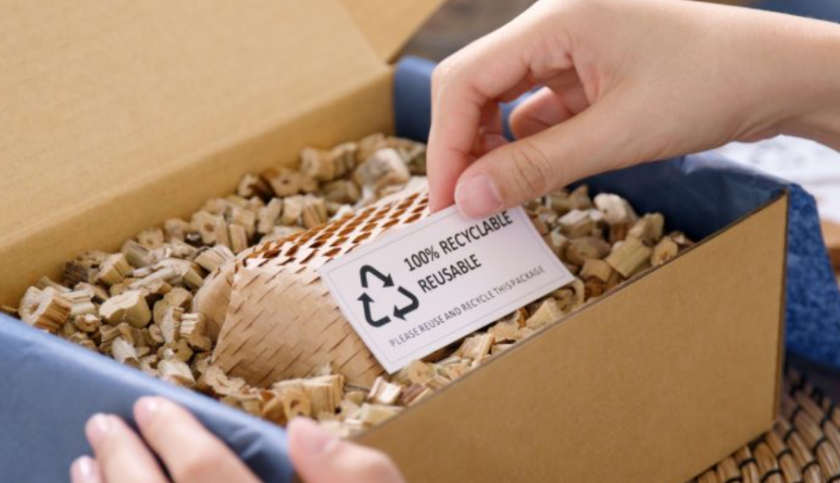The Canadian government recently unveiled its plan to ban single-use plastics on a national level. The legislation, which includes a ban on single-use grocery checkout bags, straws, stir sticks, six-pack rings, plastic cutlery and food takeout containers from “hard-to-recycle plastics,” is set to go into effect by the end of 2021, Environmental Minister Jonathan Wilkinson said.
“When a ban comes into effect, your local stores will be providing you with alternatives to these plastic products, like reusable or paper bags in place of plastic,” Wilkinson said at the Canadian Museum of History, per CBC. “I know it’s presently hard to come back from the grocery store without a single-use plastic item. You use it, you throw it in the recycling bin, and more often than not it ends up in a landfill. This has to change, which is why we’ll be working with grocers and industry leaders and provinces and territories to keep more plastic in our economy through recycling.”
This development has been in the works in Canada since 2019, and is part of a bigger plan to reach zero plastic waste in 10 years. The federal government also said that it’s developing new standards for other plastic items that will require them to contain a minimum quantity of recycled material, which would impact not just single-use plastics but others as well.
Since the plan was first introduced in 2019, the government was dealt a curveball in the form of the COVID-19 pandemic, which has catastrophically impacted the service industry. A lot of restaurants are relying on takeout service, which would be difficult without single-use plastics.
Wilkinson said the federal government purposely chose items for the ban list that already had environmentally-friendly items on the market. So, while it would be an adjustment, they wouldn’t have start at square one.
“We’ve been very sensitive to try and ensure this can be done in a very much affordable way for all businesses,” he said. “I mean, most of the beer industry has already moved away from [plastic six-pack rings and moved to hard caps on top of them, which are recyclable.”
Restaurants Canada, a nonprofit that represents the country’s food service industry, said it plans to work with the government to avoid policies that would place “undue burden” on businesses that rely on single-use items to ensure safety during the pandemic.
“The COVID-19 crisis has made the critical need for single-use items very clear,” Restaurants Canada spokesperson Marlee Wasser told the CBC. “Throughout the pandemic, restaurants have quickly and effectively adapted to evolving public health guidance. Businesses are willing to adapt their practices and make investments to support progress toward the implementation of a Canada-wide Strategy on Zero Plastic Waste. But they ant to ensure these investments are effective.”
Even before the pandemic, however, plenty of restaurants were moving to affordable but environmentally friendly options like paper straws. Within the promotional products industry, reusable straws have seen increases in popularity. There are plenty of ways for businesses to fall in line with the proposed legislation without putting themselves in a financial hole.
But the restaurants aren’t the only ones critical of the government’s plan.
The U.S.-based Plastics Industry Association voiced its concern that the Canadian legislation would bill certain plastic items like straws and carry-out bags as “toxic substances.”
“By designating plastics as ‘toxic,’ the Canadian government is recklessly making policy that could have significant negative impacts on human health,” Plastics Industry Association president Tony Radoszewski said in a statement to the CBC. “Simply put, the single-use plastic items we use every day are not toxic, but in fact are life-saving.”
Radoszewski isn’t wrong that single-use plastics have played a role in protecting people during the pandemic. But the Canadian policy isn’t designed to take these products out of the hands of consumers to force them to fight off a potentially deadly disease for no reason. The “toxic” billing has to do with the environmental effects of single-use plastics. Plastic products have polluted U.S. and Canadian waterways and impacted wildlife dramatically.
But the U.S.-based trade group is also concerned that Canada’s move could “undermine” the U.S.-Mexico-Canada Agreement, which replaced NAFTA. The agreement specifies that one member must consult the partner nations before creating new restrictions. However, it also includes language that allows exceptions for “environmental measures necessary to protect human, animal, or plant life or health,” as well as “measures relating to the conservation of living and non-living exhaustible natural resources.”
Wilkinson shot that idea down quickly, though.
“I think those concerns that are being expressed are simply wrong,” he told the CBC. “This proposal is really focused on ensuring that all products, whether they’re manufactured here or elsewhere, are treated in the same way. I don’t see a trade concern.”
Critics could find footing in one portion of the agreement that stipulates a commitment “at least in spirit” to “pause and check with the other [partner nations]” when planning something that affects a range of materials, which would include plastics and chemicals.
“What we’re trying to get to in Canada-U.S. is what every two-parent household learns very early on in their child’s life,” Dan Ujczo, a trade lawyer in Ohio, told CBC. “Before you say ‘Yes,’ you check with the other parent to see, because usually the kids know how to play one off the other.”
It’s hard to imagine a holdup like this putting Canada’s 10-year plan on hold, especially when environmental action like pushing for reusable bags or environmentally-friendly straws predates the pandemic by a number of years. But, it could be something that the Canadian government didn’t think it would need to deal with at the time.



